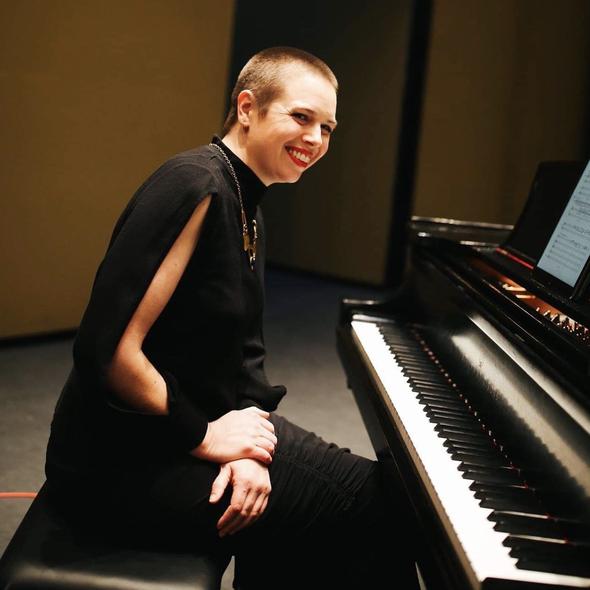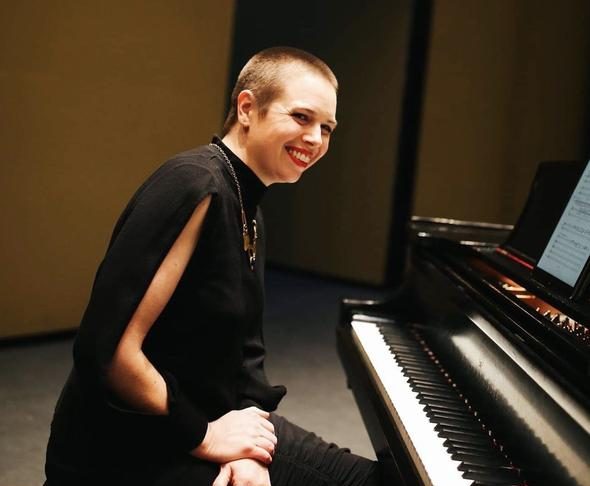By Xander Norris
Journalism student
hottytoddynews@gmail.com
MEMPHIS, Tenn. – Maeve Brophy, a UM collaborative pianist and performer, spent eight years at Vanderbilt’s Blair School of Music at Vanderbilt before returning to her hometown of Memphis last year. Since then, Brophy has contributed to the Bluff City’s growing arts renaissance through the work that she is doing in her Crosstown Arts residency.
The rebirth of the Memphis arts scene and the Concourse, a vibrant “vertical village” that serves as a sprawling conduit of creativity and interaction in a bustling metropolis, were both major draws for Brophy to come back home.

“I saw what was happening in Memphis with the arts scene – Crosstown going up and all the events happening there… Memphis really seemed to have hit a stride economically, and definitely artistically. Neighborhoods in Midtown were really thriving, and downtown has undergone an enormous change in the past 15 years,” Brophy said.
In October 2017, Crosstown Arts, a nonprofit arts organization founded in 2010, moved into its new home: Crosstown Concourse – a 16-acre $210 million mixed-use development complex that is rooted in expanding culture, arts, education, and healthcare in Memphis’ Crosstown neighborhood.
A year later, Crosstown Arts launched its artist residency program, a multi-disciplinary residency geared towards visiting and Memphis-based artists who work in visual and performing arts, music, film, writing in all genres, and any other creative discipline.
Each year, Crosstown Arts offers three-month residencies for the spring (Feb. 1 – April 30) and fall (Sept. 15 – Dec. 15). Brophy was one of the five artists chosen for the Fall 2020 program.
“We really are interested in forming diverse cohorts, so we want people from different backgrounds doing different types of things,” said Crosstown Arts Residency Manager Mary Jo Karimnia. “There has to be a certain level of professionalism in their work.”
Brophy was certainly no stranger to Crosstown Concourse prior to her residency; she has appeared twice in the Green Room, Crosstown Art’s performance space, which is fully decked out in green décor, and she accompanied a silent horror film at Crosstown Theatre last year.
Growing up, Brophy received lessons from Russian classical pianist Yakov Kasman, who won a silver medal at the 1997 Van Cliburn Competition. Brophy later studied piano performance at the Manhattan School of Music, the University of Alabama at Birmingham, New England Conservatory of Music and Texas Christian University. Brophy is also half of the duo The Brophy Sisters, along with her younger sister Linnaea, a violinist.
“I would accompany her on the piano when she was first learning violin, so we have always played as a duo,” Brophy said. “We came up with the Brophy Sisters name in 2015 around the time that we started working on our first album.”
Although Brophy intended to spend her residency composing and recording, her plans changed after Karimnia sent her pictures of the newly renovated resident music studios, nicknamed Grandma’s House and Grandpa’s House.
“I thought that would be really beautiful space to make videos — and then I thought with the pandemic and everything, all music creation is becoming virtual,” Brophy said. “I thought maybe instead of working on composing, I could work on my YouTube channel, which is another project that I had envisioned.”
Brophy currently lives in Bartlett, Tennessee, with her daughter and will not be living in Grandma’s House during her residency. Instead, she uses the house as an “extravagantly outfitted” workspace to make videos for her YouTube channel, where she performs renditions of neglected compositions by women and nonbinary composers on her Kawai RX-2 BLAK piano, provided by one of her sponsor’s, Lane Music.
Brophy said it’s her mission to highlight the work of composers who have been historically neglected because of who they were and the environment they lived in while they were composing.
During her time as a pianist at Fisk University, a private historically black university (HBCU) in Nashville, Brophy said the students she was accompanying were performing music by composers that were unknown to her. After doing some research, Brophy said she found an entire catalog of black composers that she had never learned about in the education she received at predominately white institutions.
“By working at an HBCU, I learned of the existence of major black classical composers, and to me, that was really shocking that I hadn’t learned of these composers in my own education,” Brophy said. “At that point, I decided that I had to spend the rest of my life working to get those names into the standard repertoire and getting them recognized and considered part of the canon of classical music that everybody studies; this applies to women composers as well.”
One of the underrepresented composers that Brophy is featuring on her YouTube channel is Florence Price, an African American classical composer and pianist born in Little Rock, Ark., in 1887.
Price was the first African American woman to be recognized as a symphonic composer and the first to have one of her compositions played by a major orchestra, her Symphony No. 1 in E minor was performed by the Chicago Symphony Orchestra in 1933. During her life, Price wrote a total of four symphonies; after the debut of her first, she was recognized as a very talented composer, but none of her other symphonies were performed by a major orchestra in the 1900s, and to this day, there is still no recorded evidence of a major orchestra performing any of her other symphonies.
“She struggled her entire life to be taken seriously because she was a woman, and she was black,” Brophy said.
Not long after the New Yorker published an article in 2018 detailing the discovery of Price’s long-lost manuscripts – found in an abandoned house in St. Anne, Ill. – Publisher G. Schirmer Inc., located Price’s heirs and began publishing her work. A year later, Schirmer found an additional cache of manuscripts and worked with musicologist John Michael Cooper at Southwestern University to edit some of the scores to be published. Schirmer has now published about 50 of Price’s piano pieces; Brophy says that she has bought about 10 of them for her work.
Price’s “Barcarolle” and “Until We Meet” are two pieces that Brophy bought to feature on her YouTube channel, and as of this moment, Brophy says her recorded performances of those two piano compositions are the only ones in existence on the Internet.
In addition to posting videos on YouTube and Facebook, Brophy has also promoted her content on Against the Grain, Crosstown Art’s new online platform. Against the Grain features over 100 local artists who record their musical performances from home and post their videos on Crosstown Art’s website for online viewers, who have free unlimited access to all of the website’s videos.
With the pandemic putting an end to most live performances, Against the Grain gives viewers the option to directly support local artists by buying a virtual ticket, which starts at $5. Musicians are also paid semi-monthly for all of the online revenue that their content generates.
“We are still trying to make sure that musicians know that this is still an ongoing project, actually don’t intend to ever really stop it because once these videos are on here, people can always donate,” said Crosstown Arts Music Department Manager Jenny Davis.
Brophy said she’s thrilled that Crosstown Arts is continuing to support local arts during these tough times.
“I think it’s a really wonderful thing that Crosstown did for all of us artists who had gigs canceled in the pandemic, Brophy said. “Crosstown is continuing to promote Memphis musicians just like it always has.”

Recent Comments